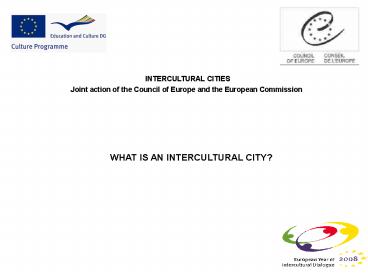INTERCULTURAL CITIES PowerPoint PPT Presentation
1 / 56
Title: INTERCULTURAL CITIES
1
INTERCULTURAL CITIES Joint action of the Council
of Europe and the European Commission
WHAT IS AN INTERCULTURAL CITY?
2
the world in motion
3
Net Migration EU25 (000s) (Eurostat)?
4
Net migration per 1000 population (2005,
Migration Policy Institute)?
5
Foreign-born as of total population (2005,
Migration Policy Institute)?
6
(No Transcript)
7
the challenge to Europes cities
8
Declining city growth rates
NB. Small cities - 200-400,000 population Medium
cities - 0.4-1m Large cities - 1m
(Turok, I. Mykhnenko, V. (2006) Resurgent
European Cities? http//www.cppr.ac.uk/media/media
_5167_en.pdf
9
Signs of revival?
(Turok, I. Mykhnenko, V. (2006) Resurgent
European Cities? http//www.cppr.ac.uk/media/media
_5167_en.pdf
10
European cities, 200,000 population (2004,
Eurostat)?
11
how different countries manage diversity
12
No policy
13
Guest worker policy
14
Assimilation policy
15
Multicultural policy
16
Intercultural policy
17
Intercultural policy
18
Intercultural policy
19
Intercultural policy
20
Urban Diversity Policy Indicators
21
Urban Diversity Policy Indicators
22
How do we think of migration and diversity?
A threat?
A nuisance?
An opportunity?
23
How might diversity UNDERMINE a city?
- Complexity
- Loss of cohesion
- Low civic commitment
- Job displacement
- Exploitation/exclusion/crime
- Indigenous backlash
24
diversity advantage
25
You get a richer environment, you have more
insights, because people reason from their own
background. Im sure of this because weve
reaped the rewards. We have an absolute advantage
from having many cultures
Stefano MarzanoCEO, Philips Design
26
How can cities make diversity their advantage?
27
How might diversity ENHANCE a city?
- Complementary skills
- Access to markets and capital
- Aspiration entrepreneurship
- Cosmopolitan brand
- Creativity innovation
28
Londoners believe the capitals mix of cultures,
languages and ethnicities is one of the best
things about living in it. This enormous increase
in the range of possibilities open to people will
lead to more exchange and interaction as people
choose from what is best in different cultures.
This is increasingly important for Londoners
jobs and incomes.
Ken LivingstoneMayor of London
29
the intercultural approach
30
Interculturalism
goes beyond equal opportunities and respect for
existing cultural differences, to the pluralist
transformation of public space, institutions and
civic culture.
31
cities should promote cross-fertilisation across
all boundaries, between majority and
minorities, dominant and sub cultures,
localities, classes, faiths, disciplines and
genres, as the source of cultural, social, civic
and economic innovation.
Intercultural innovation
Diversity advantage
32
preconditions and ingredients for an
intercultural city
33
Diversity alone is not a guarantor of prosperity
- There need to be
- Reasons to interact
- Incentives to interact
- Places, institutions and agents of interaction
34
Creating the conditions for Diversity Advantage
- A framework of rights and equalities
- Openness
- Cultural literacy
- The intercultural lens
- Intercultural leaders
35
Creating the conditions for Diversity Advantage
- Openness
- Movement
- Residence
- Trade
- Faith
- Creative expression
36
Creating the conditions for Diversity Advantage
- Cultural literacy
- Seeing the city through others eyes
- Telling the story of the city in diverse ways
37
Creating the conditions for Diversity Advantage
- Seeing
- Education
- City planning
- Transport
- Wealth creation
- through an intercultural lens
38
City planning through an intercultural lens
- If greater intercultural engagement was one of
our priorities, how would we plan things
differently? - An open space
- A housing estate
- A downtown quarter
- A school?
39
The importance of Intercultural Places and Spaces
- Libraries
- Parks
- Childrens playgrounds
- Community centres
- Open markets
- Local cafes
All the places we risk losing as life becomes
more privatised, commercial and security
conscious
40
The importance of Intercultural Places and Spaces
41
The importance of Intercultural Places and Spaces
42
The importance of Intercultural Leaders and
Innovators
- Politicians
- Business people
- Inter-faith activists
- Social entrepreneurs
- Artists
- Sports people
43
INTERCULTURAL LEADERS INNOVATORS
Cross boundaries
44
INTERCULTURAL LEADERS INNOVATORS
Go where others dont go
45
INTERCULTURAL LEADERS INNOVATORS
Build bridges At great personal risk!
46
INTERCULTURAL LEADERS INNOVATORS
Get people working together
47
cities being intercultural
48
Innovation
Palo Alto
Singapore
49
City Strategy
Toronto
50
Citizenship
Madrid
51
Conflict management
Torino
52
Rotterdam
Conviviality
53
Inter-faith
Leicester
54
New institutions
London Borough of Tower Hamlets
55
MEASURING THE INTERCULTURAL CITY
Possible indicators
- Isolation index
- Cultural mixing in housing and schools
- Inter-ethnic marriage
- New kinds of intercultural professions
- Cross-cultural business and civic networks
- Diverse cultural influences on built environment
- Shared cultural celebrations
56
Being intercultural
- Recognise difference seek out similarities
- Highlight hybridity downplay purity
- A single, diverse public sphere
- Resource the places where cultures meet
- Resource bridge-builders not gate-keepers
- Dont avoid conflict embrace it, manage it

